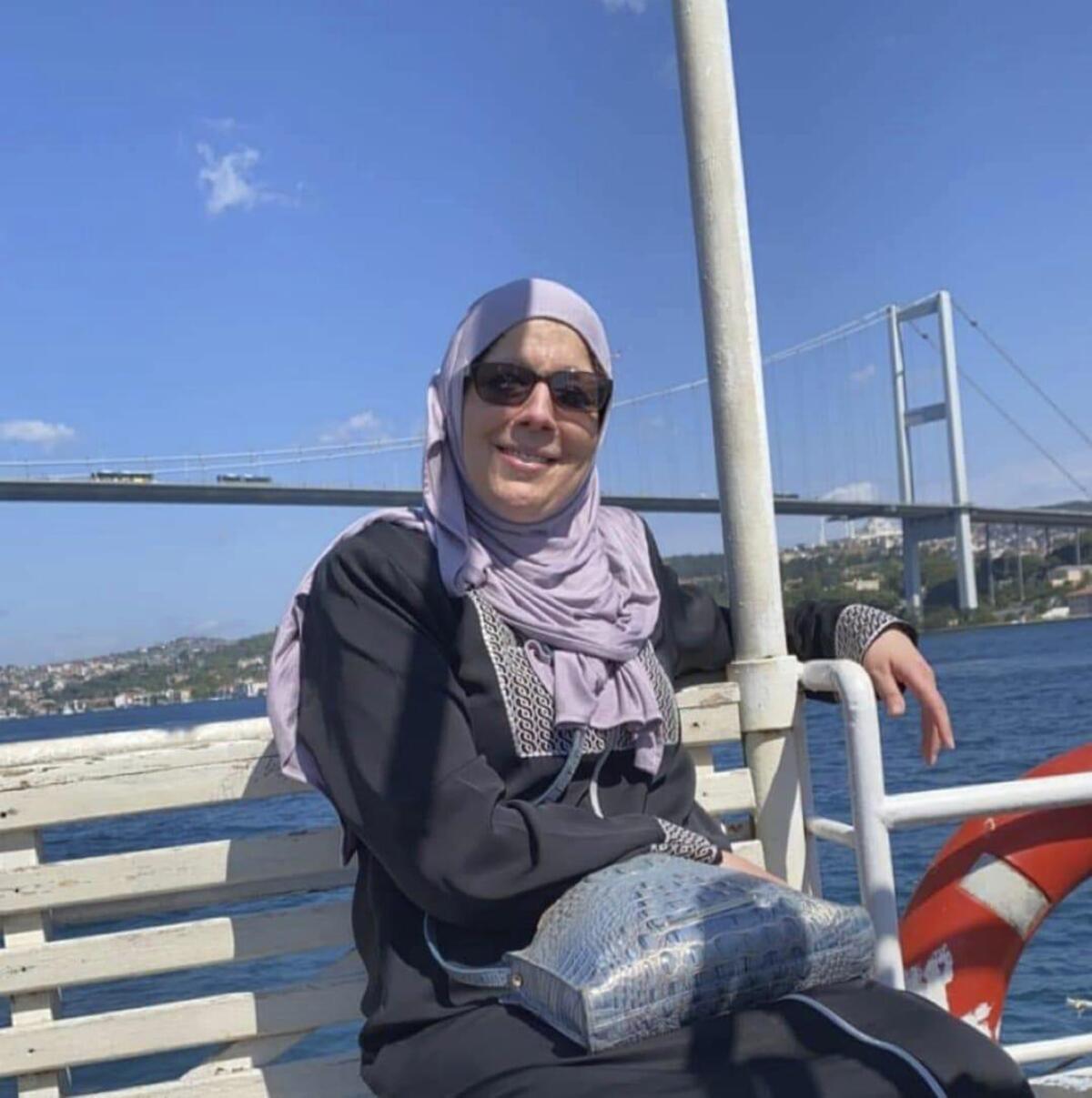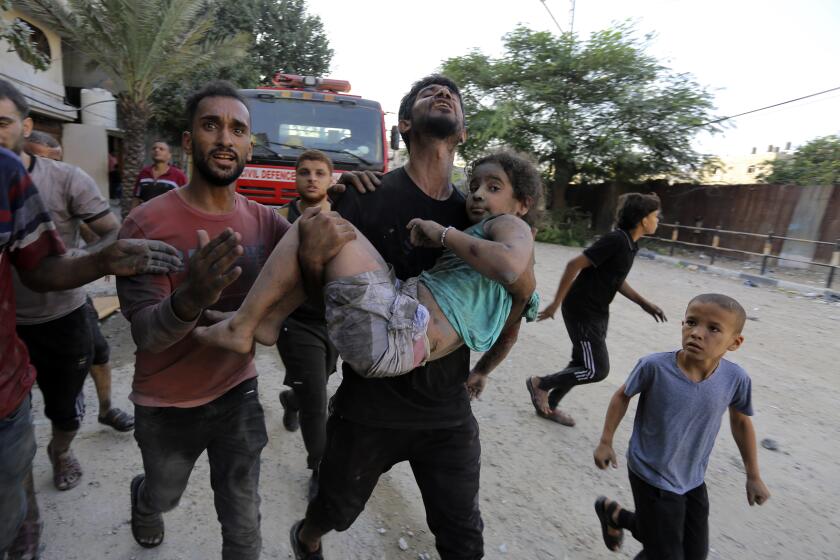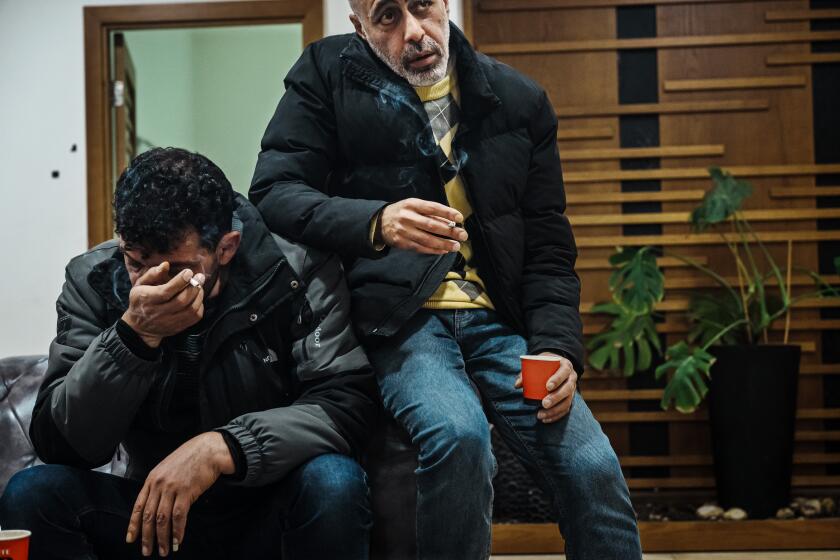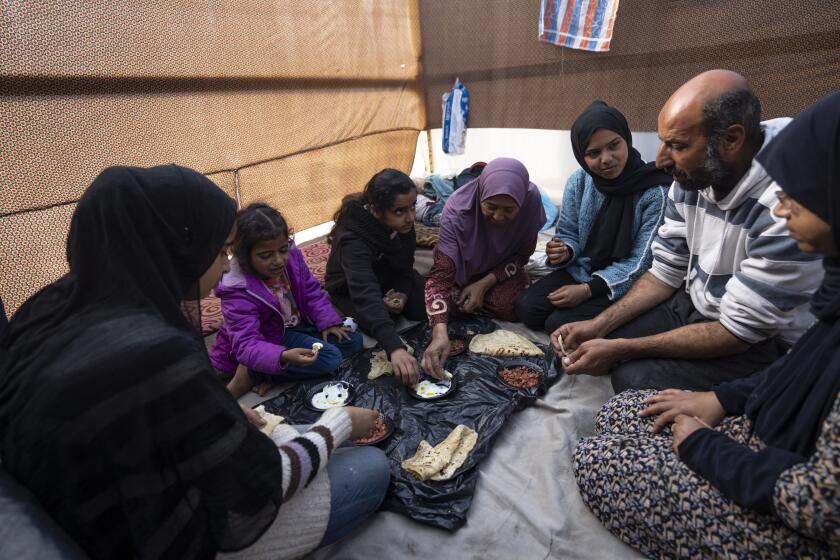Palestinian American woman facing trial in Israeli military court is released on bail

- Share via
OFER PRISON, West Bank — A U.S. citizen who was dragged out of her home and detained by Israeli authorities for more than three weeks has been released on bail to wait out the remainder of her trial in the West Bank, the latest development in a case attracting international attention for the prosecution of an American in Israeli military court.
Samaher Esmail, a 46-year-old resident of New Orleans who is of Palestinian origin, had been in the West Bank for less than three months when she was charged with incitement over photos and messages she posted to social media. Some involved images of Hamas leaders but did not explicitly call for violence.
Esmail, who has cancer and kidney problems, was said to be bruised and sickly when her lawyer visited her at Damon prison, where she was held in the north of Israel before her release.
Esmail is allowed to return to her West Bank village. She will be able to go back to the U.S. once her trial concludes, which could take months, and only if she is found not guilty.
The fact that a U.S. citizen is being tried in military court — a legal system for West Bank Palestinians separate from Israel’s civilian courts — has drawn criticism.
Israel says it provides due process and imprisons those who threaten its security. Palestinians and human rights groups say the system is awash in violations of due process and almost always renders guilty verdicts, with 95% of military court hearings ending in convictions, according to Israeli watchdog Military Court Watch.
Esmail’s representatives celebrated Thursday’s decision to release her on bail but expressed dismay at what they perceive as a tepid U.S. government response to the incarceration of an American by Israel.
Civilian deaths in Gaza have fueled global outrage. But many Israelis, still raw from Hamas’ Oct. 7 attack, have scant interest in the war’s toll on Palestinians.
“We’re ecstatic, because we feel like this rarely happens,” said Esmail’s son Suliman Hamed, who lives in New Orleans. “I feel like because of all the media coverage they may have done it fairly this time around. I really thought I might never see her again.”
Esmail was dragged out of her house by Israeli forces in the middle of the night Feb. 6. A video of the incident provoked outrage on social media. During the arrest, her lawyer alleges, Israeli forces beat Esmail and did not give her time put on her hijab, the headscarf worn by some Muslim women. An Israeli interrogator did not ask properly if Esmail wanted an attorney present, the lawyer says.
Little was known about her whereabouts, the charges against her or her condition. She was not able to see a lawyer until four days after her arrest, according to court documents from her initial hearing.
With family trapped in Gaza, two Palestinian friends in the West Bank hold each other up amid crushing grief.
Esmail reportedly did not have access to her medications for at least the first six days of her detention and fainted in prison, according to a letter written to U.S. Secretary of State Antony J. Blinken by Jonathan Franks, a crisis management consultant who represents Americans detained abroad and is working for Esmail’s family. A consular officer did not visit Esmail until 14 days after her arrest, Franks said Thursday.
“I was extremely frustrated, given the issue of her potentially having been abused in custody, that it took 14 days to get a consular officer to see her,” said Franks, who flew from the U.S. to attend Esmail’s hearing. “I would like to see a public statement from the embassy that it’s our expectation that Americans are not going to be put through these military commissions. And I don’t think that that’s too much to ask of a friend.”
Teenage friends Angelina, who is Palestinian, and Adar, who is Jewish Israeli, talk about the Hamas attacks on Israel and Israel’s war on Gaza. ‘It’s OK to disagree.’
The judge ruled Thursday at Israel’s Ofer Prison that the military court did not have jurisdiction to prosecute Esmail for posts she made while in the U.S. but charged her with incitement for posts she made while in the West Bank. Esmail attended the hearing remotely, via videoconference from Damon Prison.
Three of the posts involved a figure resembling Abu Obeida, the spokesman of Hamas’ armed wing. Under two images was the inscription “Victory or death of the Saints, God willing,” according to court documents. Esmail changed her profile picture to a masked man resembling Obeida twirling a ball emblazoned with U.S. and Israeli flags. She also posted a photo of Yahya Ayyash, who built bombs for Hamas and was killed by Israel in 1996, against the backdrop of Al Aqsa mosque.
None of the posts received more than 11 likes.
“The posts constituted incitement and support of an illegal organization, and are therefore not protected speech,” the judge ruled.
The court’s decision means Esmail will have to remain in the West Bank until the legal proceedings against her are complete. During that time, she is barred from posting publicly on social media. Her next trial at a military court is set for March 31, according to Franks.
In the meantime, her family is worried that she will not have access to cancer treatment in the West Bank and that Israel may arrest her again.
The hearings followed a military court hearing six days after her arrest in which the judge openly questioned the wisdom of prosecuting an American citizen and wondered if the court had jurisdiction, according to case files obtained by the Associated Press.
“It is not wise to file indictment against her based on the allegations,” the judge said. “In the substantial sense, nor even in the political sense.”
Despite the judge’s recommendation that Esmail be released on bail, the military prosecutor filed an indictment.
Palestinians seeking refuge in southern Gaza say every day has become a desperate struggle to find food, water, medicine and working bathrooms.
The case comes at a time of high tension between the U.S. and Israel over the war in Gaza, which has claimed more than 30,000 lives since Oct. 7, when Hamas militants staged a cross-border attack, killing some 1,200 Israelis and dragging 250 hostages back to Gaza.
Since that day, Israel has clamped down on online speech perceived to glorify Hamas or the Palestinian cause. Palestinians have been arrested by Israeli authorities, fired by Israeli employers and expelled from Israeli schools for speech deemed incendiary, rights groups say.
Hamed, Esmail’s son, said the family was disappointed that the embassy did not send a high-ranking official to attend Thursday’s hearing, despite requests.
The U.S. Embassy did not have an immediate comment.
Esmail’s family said she often travels between the West Bank and the U.S., where she manages a family-owned grocery store in the New Orleans suburb of Gretna and works as a tutor at a high school. She was in the West Bank to see relatives and to testify at a hearing about a previous encounter with Israeli forces in which she was beaten, her representatives said.
“It’s clear why they’re holding her,” said Hamed. “They’re trying to use her as an example and to intimidate Palestinians. Cases like these have people deleting their social media, canceling their trips to Palestine. They’re trying to silence us.”
More to Read
Sign up for Essential California
The most important California stories and recommendations in your inbox every morning.
You may occasionally receive promotional content from the Los Angeles Times.














